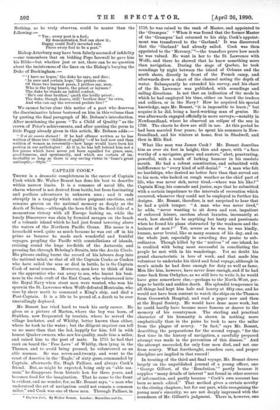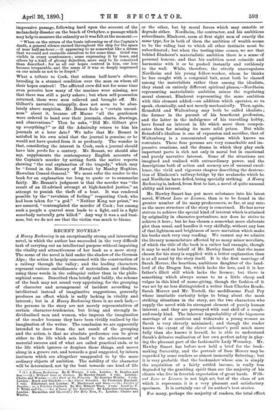CAPTAIN COOK.*
THERE is a dramatic completeness in the career of Captain Cook which Mr. Walter Besant has done his best to describe within narrow limits. It is a romance of naval life, the charm whereof is not derived from battle, but from fascinating and perilous adventures in unknown seas ; and it ends abruptly in a tragedy which excites poignant emotions, and remains graven on the national memory as deeply as the death of Nelson,—although the hero fell in the flood-tide of a momentous victory with all Europe looking on, while the lonely Discoverer was slain by frenzied savages on the beach of a volcanic island which he had just found towering above the waters of the Northern Pacific Ocean. His name is a household word, quite as ranch because he was cut off in his prime as because he made such wonderful and fruitful voyages, peopling the Pacific with constellations of islands, cruising round the huge ice-fields of the Antarctic, and pressing far, through Behring's Straits, into the Arctic Circle. His piteous ending burnt the record of his labours deep into the national mind, so that of all the Captain Cooks or Cookes who have sailed the seas or died in battle, he is the Captain Cook of naval renown. Moreover, men love to think of him as the apprentice who ran away to sea, who learnt his busi- ness in the rude craft of the East Coast, who volunteered into the Royal Navy when stout men were wanted, who won his spurs in. the St. Lawrence when Wolfe defeated Montcalni, who rose by sheer merit to command a King's ship, and died a Post-Captain. It is a life to be proud of, a death to be ever unavailingly deplored.
Mr. Besant has tried hard to track his early career. He gives us a picture of Marton, where the boy was born, of Staithes, now frequented by tourists, where he served the village huckster, and of Whitby, better known than either, where he took to the water ; but the diligent inquirer can tell us no more than that the lad, happily for him, fell in with honest Quaker owners, who saw his quality, made him a sailor, and raised him to the post of mate. In 1755 he had that rank on board the 'Free Love' of Whitby, then lying in the Thames, and to avoid being pressed, he volunteered as an able seaman. He was seven-and-twenty, and went to the coast of America in the 'Eagle,' of sixty guns, commanded by Captain, afterwards Sir, Hugh Palliser, and always Cook's friend. But, as might be expected, being only an "able sea- man," he disappears from historic ken for three years, and becomes food for the imagination. That he came to the front is evident, and no wonder, for, as Mr. Besant says, "a man who understood the art of navigation could not remain a common sailor," and Cook was one of these men. Through Palliser, in
• Captain Cook, By Walter Besant. London : Macmillan and Co.
1758, he was raised to the rank of Master, and appointed to the Grampus.' "When it was found that the former Master of the 'Grampus' had returned to his ship, Cook's appoint- ment was transferred to the Garland.' It was discovered that the Garland' had already sailed. Cook was then appointed to the Mercury,' "—the transfers prove how much he was valued. He went in her to the St. Lawrence with Wolfe, and there he showed that he knew something more than navigation. During the siege of Quebec, he took soundings by night between the island of Orleans and the north shore, directly in front of the French camp, and. afterwards drew a chart of the channel noting the depth of water. Subsequently he extended his survey, and his chart of the St. Lawrence was published, with soundings and sailing directions. Is not that an indication of the mode in which he had employed his time, either on board the traders. and colliers, or in the Navy? How he acquired his special knowledge, says Mr. Besant, "it is impossible to learn ;" but acquire it he did, being a hard-working man of genius. He was afterwards engaged officially in more surveys,—notably in. Newfoundland, where he observed an eclipse of the sun in_ 1766. The charts he drew are still in use. At this period he had been married four years; he spent his summers in New- foundland, and his winters at home, first in Shadwell, and then in Mile End.
What like man was James Cook? Mr. Besant describes him as over six feet in height, thin and spare, with "a face worthy of a navigator, grave and austere," alert, penetrating, powerful, with a touch of lurking humour in his resolute mouth. He had a robust constitution, and submitted with indifference to "every kind of self-denial." "A man who felt no hardships, who desired no better fare than that served out to his men, who looked on rough weather as the chief part of life, who was never sick, never tired,—where was his like ? " Captain King, his comrade and junior, says that he submitted_ with a certain impatience to the intervals of recreation which occurred, whenever they could not be employed to further his designs. Mr. Besant, therefore, is not surprised to hear that he had a quick temper. "A man who was never tired," he adds, "never wanting to sit down and rest, impatient of enforced leisure, careless about luxuries, incessantly at work, how should he be anything but hasty and passionate when he found his plans obstructed by the weakness and the laziness of men ? " Yet, severe as he was, he was kindly, human, never brutal, like so many seamen of his day, and on the whole just, especially in awarding due praise to sub- ordinates. Though killed by the " natives " of one island, he- is credited with being most successful in conciliating the people he met with in his wanderings. Yet no doubt his grand characteristic is love of work, and that made him volunteer to undertake his third and fatal voyage, although in. men's minds he had done enough for duty as well as fame_ Men like him, however, have never done enough, and if he had come back from Owhyhee, as we still love to write it, he would have gone somewhere else,—perhaps to the North-West, per-. haps to battle and sudden death. His splendid temperance in all things had kept him hale and hearty at fifty-one, and he would not have been content to watch the ships on the Thames from Greenwich Hospital, and read a paper now and them at the Royal Society. He would have done more work, but he could hardly have become more famous or dearer to the memory of his countrymen. The sterling and practical. character of his humanity is shown in nothing more emphatically than in the pains he took to save the sailor from the plague of scurvy. "In fact," says Mr. Besant, describing the preparations for the second voyage, "for the- first time in the history of navigation, a carefully prepared attempt was made in the prevention of this disease." And. the attempt succeeded, for only four men died, and not one from scurvy. What forethought, ceaseless care, and proper- discipline are implied in that record!
In treating of the third and final voyage, Mr. Besant draws. largely on the unpublished journal of a young officer, one "George Gilbert, of the Resolution," partly because it supplies "many details of interest" not found in other sources. of information, and partly because "Cook's own account has been so much edited." That method gives a certain novelty to the closing chapters ; but for our part, while recognising the young man's sincerity, we are not deeply impressed with the soundness of Mr. Gilbert's judgment. There is, however, one impressive passage, following hard upon the account of the melancholy disaster on the beach of Owhyhee, a passage which may help to measure the calamity as it was felt at the moment :—
"When on the return of the boats informing Us of the Captain's death, a general silence ensued throughout the ship for the space of near half-an-hour ;—it appearing to us somewhat like a dream that we could not reconcile ourselves to for some time. Grief was visible in every countenance ; some expressing it by tears, and others by a kind of gloomy dejection, more easy to be conceived than described : for as all our hopes centred in him, our loss became irreparable, and the sense of it was so deeply impressed on our minds as not to be forgot."
What a tribute to Cook, that solemn half-hour's silence, brooding in a stunned condition over the man on whom all their hopes centred ! The afflicted crew did not for some time even perceive how many of the marines were missing, nor that there was still a party ashore ; but when self-possession returned, these were won relieved and brought off. Mr. Gilbert's narrative, unhappily, does not seem to be abso- lutely above suspicion. Mr. Besant feels a "certain uneasi- ness" about it, because off Macao "all the gentlemen were ordered to hand over their journals, charts, drawings, and observations." Then he asks, "Did Mr. Gilbert give up everything?" or did the Admiralty return to him his journals at a later date? We infer that Mr. Besant is satisfied in his own mind that the journal is genuine, or he would not have quoted from it so profusely. The wonder is that, considering the interest in Cook, such a journal should have lain perdu for a century. Mr. Besant, we should also say, supplements the contemporary English accounts of the Captain's murder by setting forth the native reports showing "the real explanation of the tragedy," which may be "found in the History of Hawaii by Manley Hopkins, Hawaiian Consul-General." We must refer the reader to the book for an explanation too long to quote or to summarise fairly. Mr. Besant's judgment is that the murder was "the result of an ill-advised attempt at high-handed justice," an attempt to punish the theft of a boat. It was rendered possible by the "revulsion of feeling" respecting Cook, who had been taken for "a god." "Neither King nor priest," we are assured, "contemplated the murder of Cook ; but among such a people a quarrel soon leads to a fight, and in a fight somebody naturally gets killed." Any way it was a sad busi- ness, but we do not see that the victim was much to blame.



































 Previous page
Previous page